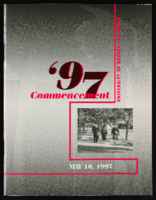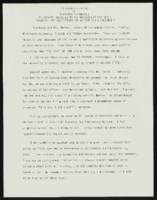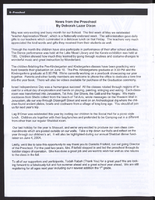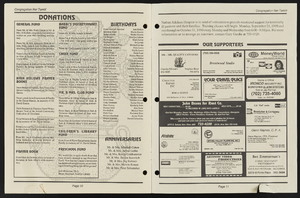Search the Special Collections and Archives Portal
Search Results
Jany Ortiz-Robinson Papers
Identifier
Abstract
The Jany Ortiz-Robinson Papers (1984-2020) contain the papers of Ortiz-Robinson, who has worked in Nevada's early childhood education field for over twenty years. The collection mainly consists of awards and certificates awarded to Ortiz-Robinson over her career, from various organizations including the Economic Opportunity Board of Clark County, The Nevada Registry, Clark County School District, and the Nevada Association of the Education of Young Children. Also included is a copy of her dissertation from the University of Nevada, Las Vegas (UNLV), materials documenting graduation ceremonies, and yearbooks from her time at Moapa Valley High School and the University of San Francisco. A scrapbook documenting her senior year at Moapa Valley High School (1984-1985) contains photographs, ephemera, newspaper clippings, and handwritten notes about her final year in high school.
Archival Collection
William Helms oral history interview
Identifier
Abstract
Oral history interview with William Helms conducted by Denise Wolff on March 04, 1980 for the Ralph Roske Oral History Project on Early Las Vegas. Helms discusses the transformation, growth, and development of the public education system in Las Vegas, Nevada.
Archival Collection

University of Nevada, Las Vegas (UNLV) Spring 2020 commencement program
Date
Archival Collection
Description
Commencement program from University of Nevada, Las Vegas Commencement Programs and Graduation Lists (UA-00115).
Text
Rosemary Cleman (Conner) oral history interview
Identifier
Abstract
Oral history interview with Rosemary Cleman (Conner) conducted by Beatrice Owens (Gillard) on March 8, 1981 for the Ralph Roske Oral History Project on Early Las Vegas. Conner discusses moving to Las Vegas, Nevada to become a teacher for emotionally disturbed children and assisting with the creation of the Nevada Girls Training Center. Conner also discusses the segregation of the African American community. The interview concludes with Conner discussing the reemergence of mining communities in Nevada and her close interaction with Nevada governors during her career in social services.
Archival Collection

Transcript of interview with Thomas Rodriguez by Maribel Estrada Calderón, September 10, 2018
Date
Archival Collection
Description
Known for “raising hell and making a difference” in the Las Vegas Valley, Thomas Rodriguez has dedicated more than four decades of his life to the political, educational, and social advancement of the Latinx community. Tom was born in 1940 to Jennie Gomez and Joseph Rodriguez in a Topeka, Kansas neighborhood its residents called The Bottoms. Mexicans, Mexican Americans, American Indians, African Americans, among other peoples lived in this diverse and beloved community. In 1956, the Urban Renewal Program, a program funded by the Federal Government that sought to raze neighborhoods the city considered to be “slums,” forced The Bottoms’ residents to abandon their homes. Rodriguez recalled the effects that this event had on his family and on his educational career. Despite his family’s relocation, he graduated from a high school located in a nearby neighborhood in 1958. Years later, the activism and ideology of the Chicano Movement of the 1960s taught Rodriguez that to overcome the injus
Text

University of Nevada, Las Vegas (UNLV) 34th commencement program
Date
Archival Collection
Description
Commencement program from University of Nevada, Las Vegas Commencement Programs and Graduation Lists (UA-00115).
Text

"A Dream Fulfilled" speech by Roosevelt Fitzgerald
Date
Archival Collection
Description
From the Roosevelt Fitzgerald Professional Papers (MS-01082) -- Unpublished manuscripts file. Speech for 112th Founders Day celebration of Jackson State University.
Text
Sandra Candel oral history interview
Identifier
Abstract
Oral history interview with Sandra Candel conducted by Elsa Lopez, Monserrath Hernández, and Barbara Tabach on October 03, 2019 for the Latinx Voices of Southern Nevada Oral History Project.
Sandra Candel talks of her childhood growing up with her grandparents in Guadalajara, Jalisco after her mother immigrated to America. She moved to California to attend university before moving to Salt Lake City, Utah, where she raised her children and began homeschooling them. This path led to Sandra opening a Montessori school, igniting her interest in education. She talks of her pursuit of both a Masters Degree from Drexel University and a Doctoral Degree from the University of Nevada, Las Vegas (UNLV). Sandra concludes her interview with discussion of her research and current employment as a part-time instructor for the Department of Interdisciplinary, Gender, and Ethnic Studies at UNLV.
Subjects discussed include: Guadalajara; Salt Lake City, Utah; Sensitive Teaching Practices; Multi-generational families
Archival Collection


